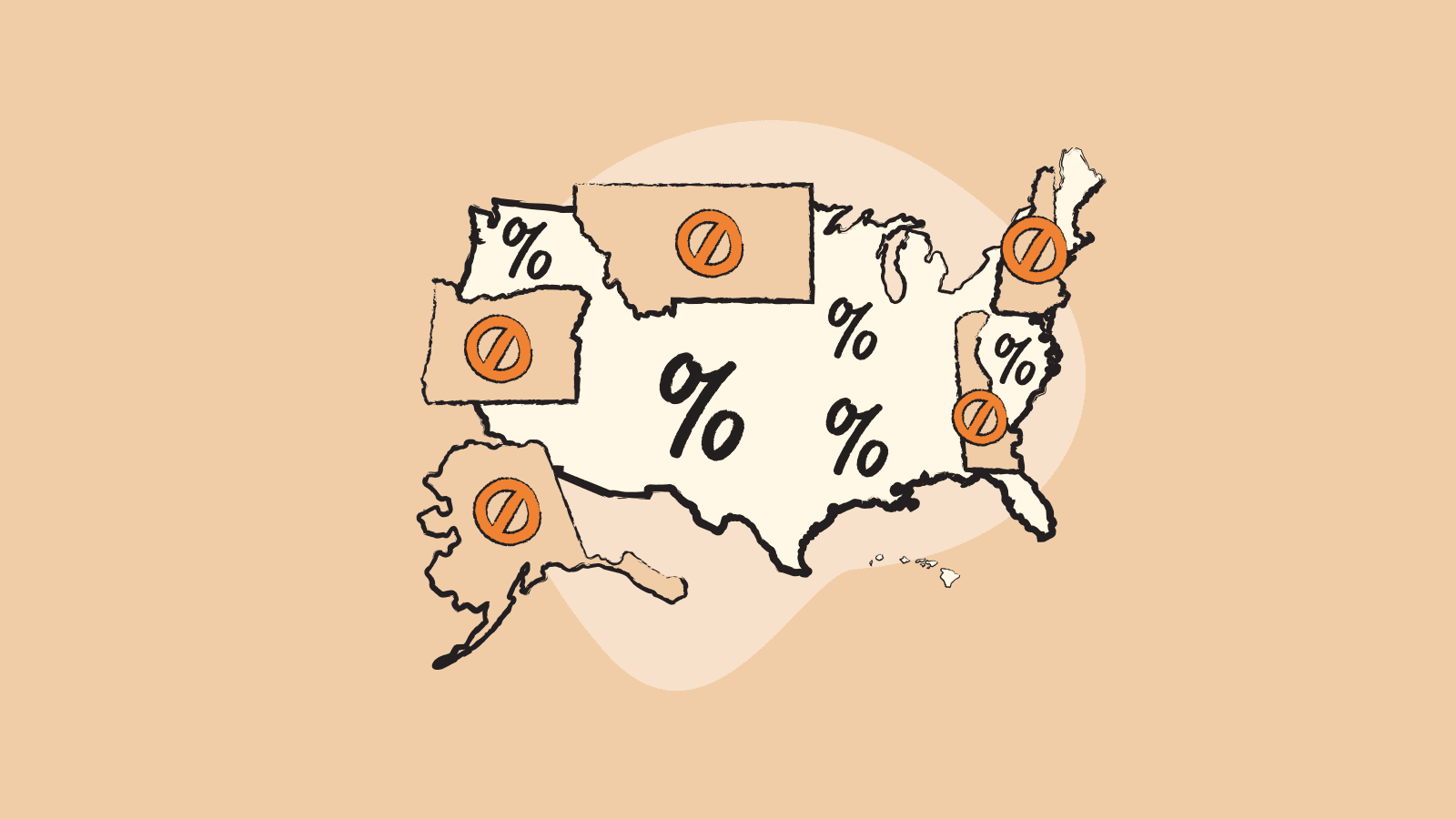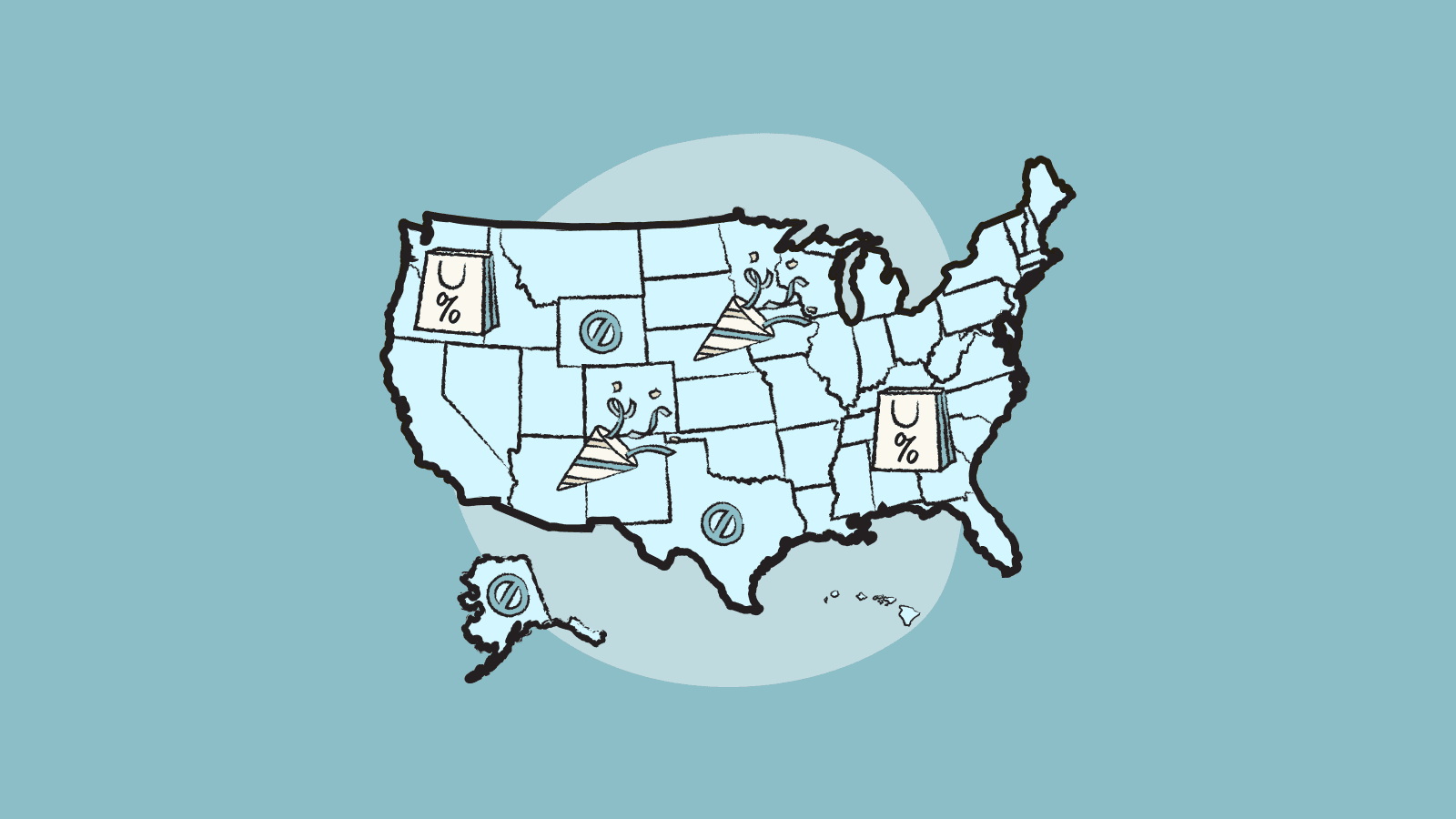You're here:
The NOMAD states: Which states don't have sales tax?

Almost everything you sell comes with a corresponding tax that buyers ought to pay. As a business owner, you already know how this can become complicated. Every state has its own rules, and local governments often add extra layers on top.
The good news? Five states don't charge statewide sales tax at all! What are these states, and how should you deal with sales here?
This article serves as a practical tax guide for businesses operating or transacting in NOMAD states. Read on to learn which states don't have sales tax at all and what you must do as a business.
What are NOMAD states?
As a business, it’s important to understand how US sales tax works as well as sales tax rules by state for legal and regulatory compliance. But of all, it’s interesting to know the NOMAD states because of their unique tax structure. For the uninitiated, these refer to the five U.S. states that don't impose a statewide sales tax:
- New Hampshire
- Oregon
- Montana
- Alaska
- Delaware
For businesses (and shoppers alike), these states are quite attractive as far as taxes are concerned. Why? Everyday purchases don't include an added sales tax at checkout. This could mean cutting costs on your tax obligations for your business.
However, operating in NOMAD states doesn't always mean you're completely free from taxes. Actually, some businesses rely on other revenue sources. Meanwhile, others allow local governments to add their own charges. Still, you must keep up with your tax obligations while taking advantage of the tax benefits in NOMAD states.
Why do NOMAD states skip sales tax?
Sales taxes contribute to the overall state tax that funds government services in the locality. However, not every state relies on this since they have other alternative sources of revenue.
If you're wondering why the NOMAD states took a different path, understand that they are shaped by history, motivated by politics, and driven by alternative sources. Here's why these states continue to skip sales tax:
- Historical implications: Some NOMAD states resisted the sales tax from the get-go, even as other states had already adopted it during the Great Depression. Their economies led them to adopt other forms of taxation due to its practicality. It's safe to say that their history has set the foundation for their tax policies today.
- Political decisions: Political leaders in NOMAD states have long taken a stand against sales tax as a matter of principle. In fact, avoiding sales tax has made them more appealing to voters and businesses alike, while encouraging economic activity in the state. These political choices continue to influence how these states shape their tax systems.
- Alternative taxes: NOMAD states rely on other revenue streams, such as property and corporate taxes, not only sales tax. For example, Alaska benefits from oil and natural resource revenues; Delaware relies on business-related taxes. These alternatives allow them to fund government services without adding a sales tax.
What to know about each NOMAD state
Each of the NOMAD states has a different way of generating revenue without a statewide sales tax.
If you're doing business in these areas, it's crucial to understand their unique tax structures and how they might impact your operations. Likewise, knowing the nuances helps you prepare for potential obligations and avoid a costly sales tax audit down the line.
To understand how each NOMAD state requires no sales tax, have a sneak peek at the table below.
| NOMAD States | Sales Tax Status | Other Tax-related Concerns |
|---|---|---|
| New Hampshire | No state sales tax |
|
| Oregon | No statewide sales tax |
|
| Montana | No statewide sales tax |
|
| Alaska | No state sales tax |
|
| Delaware | No state or local sales tax |
|
Let's expound on each NOMAD state.
New Hampshire: Tax-free shopping with hidden trade-offs
New Hampshire's lack of a state sales tax makes it a popular destination for shoppers from neighboring states, such as Massachusetts and Vermont. However, businesses operating here should be aware of other taxes that may offset the perceived savings. Think of Business Profits Tax (BPT) and Business Enterprise Tax (BET), you might be responsible for
Take it from Nicolas Breedlove, CEO of PlaygroundEquipment.com. He recommends understanding your tax obligations by heart, even if you’re operating in a NOMAD state. "In New Hampshire, for example, you need not be responsible for any sales tax as mandated by the state law. However, skipping this doesn't necessarily mean skipping other obligations. 100% tax compliance is key!”
Oregon: No sales tax, but income taxes take the lead
Oregon offers shoppers and businesses the perk of tax-free purchases, which is especially popular in retail hubs like Portland. However, the state relies on higher personal and corporate income taxes to generate funding, rather than on the sales tax.
Stanislav Khilobochenko, Vice President of Customer Services at Clario, sees the benefits of selling anti-spy products to clients in NOMAD states. However, he’s still wary of other tax obligations: “In Oregon, for instance, while sales are tax-free, the trade-off often shows up in income tax liabilities. You may still face other tax obligations, such as the Corporate Activity Tax (CAT).”
Montana: Tax-free state with resort area exceptions
Montana doesn't levy a statewide sales tax. However, local governments in resort areas can impose small "resort taxes." This means your business in a tourist-driven market should plan for region-specific compliance. This tax currently caps at 3% for a limited number of tourist locations around the state.
Learn from Jeffrey Zhou, CEO and Founder of Fig Loans. He suggests being particularly diligent with financial management and tax compliance, especially for businesses operating in NOMAD states. "In Montana, the absence of a statewide sales tax is a draw. However, resort-area levies remind businesses that tax-free doesn't always mean tax-free everywhere."
Alaska: No state sales tax, local rules still apply
Alaska has no state-level sales tax. However, many local municipalities impose their own by creating a patchwork of obligations. For instance, Juneau, as one of the state's biggest cities, has a city sales tax of 5%. So, as a business owner, carefully check local rules to avoid compliance gaps.
Alaska's state sales tax has been a much-debated issue in recent years, and future changes are always possible. For now, businesses benefit from no statewide sales tax, but they should keep an eye on potential updates. On top of that, Alaska is one of the few states without a personal income tax, making its tax landscape stand out even more.
Delaware: True no-sales-tax haven for shoppers and businesses
Delaware is unique for having no state or local sales tax at all. This makes it a magnet for cross-border shoppers and corporations alike. It generates revenue through business taxes, licensing fees, and franchise taxes. As a business operating in this no-sales-tax state, capitalize on its tax benefits, but be wary of other fees or charges.
Ben Bouman, Business Owner at HeavyLift Direct, emphasizes the importance of understanding the tax implications in NOMAD states. Their company has its fair share of transacting auto equipment pieces in Delaware. "Delaware's no-sales-tax model is a major draw. But businesses should recognize that the real cost comes through corporate and business-related taxes."
Practical tips for businesses in NOMAD states
Running a business in a NOMAD state may spare you from charging statewide sales tax. But heed our advice: It doesn't necessarily mean tax responsibilities disappear altogether. Remember, each state has its own quirks, and staying 100% tax compliant is completely necessary.
As a business operating in NOMAD states, how do you keep it up and running amid the absence of sales tax? Here are some practical ways to keep your operations smooth and tax-ready:
- Keep tax records clean. Even without sales tax, you still need clear documentation for other tax obligations. Use tools, such as a proper tax invoice system for record purposes and tax filing. These tools can help you stay organized and avoid issues during audits.
- Don't forget other taxes. NOMAD states often rely on property, corporate, or income taxes instead of sales tax. Factor these into your financial planning to avoid being caught off guard.
- Factor in local taxes. While there's no statewide sales tax, places like Alaska and Montana allow local municipalities to charge their own. Therefore, always check local rules before pricing your products or services. That way, you remain tax compliant as always!
- Use competitive pricing. Sure, the absence of sales tax can be a selling point for your business. Chances are, you highlight this advantage in your sales and marketing to attract both local and out-of-state customers. But remember: Price your products/services fairly and strategically! Learn more about how to price your product competitively.
- Stay updated on legislative changes. Tax policies can easily and quickly evolve. Keep track of updates with resources on sales tax compliance for multistate businesses. That way, your operations stay aligned with the latest requirements.
- Use tax compliance software. Automated tools can simplify tax record-keeping and reporting, not to mention cross-state compliance. Take Quaderno's tax compliance software for e-commerce businesses. Our tool can help you streamline your tax records and reports to promote compliance at all times.
What can help with sales tax?
Operating in a NOMAD state can make tax compliance simpler, but it doesn't mean you can forget about taxes altogether. Remember, each of these states has its own way of generating revenue, including property, corporate, and local sales taxes.
As a business operating or transacting in a NOMAD state, use the sales tax advantage to your benefit. However, always keep an eye on other obligations. With proper planning, you can stay compliant while maximizing the benefits of these tax-friendly states!
To stay tax compliant as always, even if you do business in a NOMAD state, consider leveraging Quaderno's automated software for online businesses. Sign up today for a free trial!
Thanks to Jesse Galanis for sharing his expertise and writing this article for us!
Note: At Quaderno we love providing helpful information and best practices about taxes, but we are not certified tax advisors. For further help, or if you are ever in doubt, please consult a professional tax advisor or the tax authorities.


